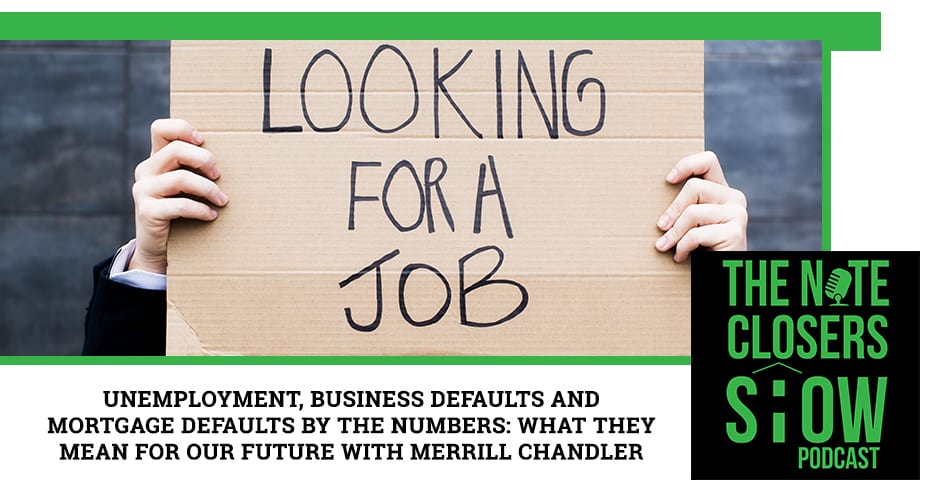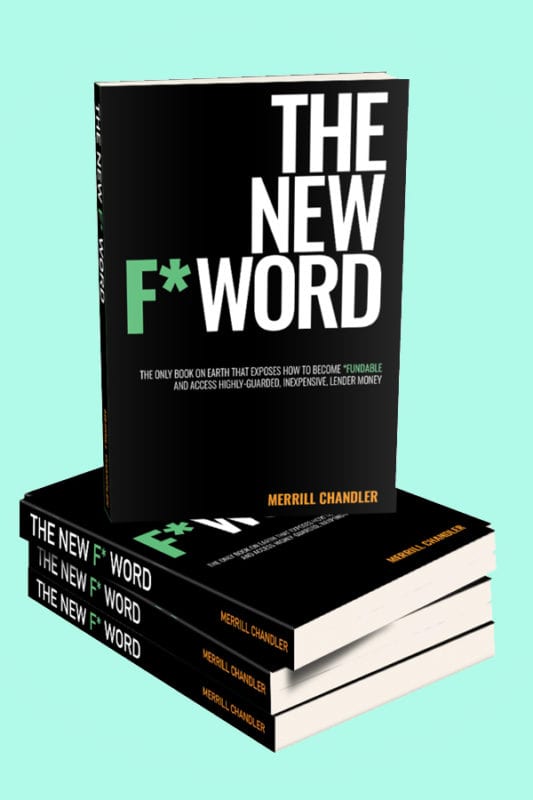
The numbers we have out there right now can be scary, and it is tempting for many people to have knee-jerk reactions which can ultimately hurt them in the long term. In this episode, Scott Carson sits down with the Credit Messiah, Merrill Chandler, to make sense of the numbers in unemployment, business defaults, and mortgage defaults and what these mean for the future. Merrill is a high-performance personal and business fundability coach at Get Fundable.com and the Get Fundable podcast host. Scott and Merrill trade insights and explain how you can hack your fundability and maintain healthy relationships with your lenders during this crisis. They see a lot of opportunities amid this crisis, but only if you know when and how to act. Right now, too many people make decisions that will sully their credit lines and hurt their relationships with their lenders. Listen and learn how to avoid these pitfalls.
—
Watch the episode here
Listen to the podcast here
Unemployment, Business Defaults And Mortgage Defaults By The Numbers: What They Mean For Our Future With Merrill Chandler
We bring back our regular scheduled guy, Merrill Chandler, the credit Messiah. On this episode, Merrill and I sit down and talk about all the big numbers that are coming out of the Coronavirus that government shutting things down and where we see the market going. We’ll talk about the unemployment business, small business growth, or decline defaults, and a whole variety of other things. Stick in as we talk about where are the numbers at and what does this means for the near future.
—
I’m excited to have our good friend, Merrill Chandler from the Get Fundable! Podcast. He’s the credit Messiah sharing his credit bible and helping Americans get their profiles fundable on the residential and commercial side of things. We were talking before rock and rolling with this episode about some different numbers that is scaring people. Welcome, Merrill.
Thank you. There’s a little saturation going on because almost every other day we’re pelting all of our social with full-blown Facebook Lives, updates, podcasts that are triggering because there are a lot of questions going on out there about how do I prepare for a recession. We call it a soft landing. I did a three-day masterclass. We came up with it two days earlier about how to thrive, how to survive, how to recover, and how to parachute down rather than crash and burn if the worst-case scenario hit, but some of these numbers keep portending to be the worst-case scenario. As you and I were talking here in Salt Lake City, appreciation and properties are still going up and driving. The offers that are being accepted are over asking price. There are mixed signals going on out there. Let’s take a look at these numbers and give our interpretation. This is a great thing for our audience because they need to know that all is not right in River City.
The same thing here in Austin, Texas. The appreciation is still going up. People are like, “You’re still selling stuff.” We all know, numbers can’t keep going up like it is. They’re propped up artificially because we’re still in the limbo phase, everybody has modified things and still figuring out where everything is at on stuff. Let’s talk with the first number, the forbearance numbers. It was in the news that came out and talked about under 10% of all mortgages.
Ten percent of mortgagees are filing for forbearance and deferment. I also attended a web class on forbearance agreements by some of the biggest servicers out there. Their number one concern was because it’s topic shop. This is me talking shop. This is me fly on the wall. I don’t belong there. I’m a borrower facing guy and I attend all the lender facing events out there. Do you know what their number one thing is? How to handle the crush of the short-term, the 90-day to the six months, but every single one of them is planning permanent. I have a flow chart here that shows how to prepare for permanent forbearance. I’m looking at one that says on 07/01 if they give a window, they have a second six-month forbearance agreement on January 1st.
They said the words perpetual. We all know that no one is going to give everybody a free mortgage. This is me speculating but you know this market better than I do. I don’t think the lenders want to have entire neighborhoods empty of inventory that take five-plus years to rent out or sell off again. They don’t want to go, especially for seconds, to the expense of going through the foreclosure process compared to the yield on barely making their money back and some of them didn’t get their money back. Where are you on this one? I know that they’re looking to keep people in the houses so that when that bounces back, they can start paying them again instead of a landlord or a new real estate investor.
I’ve been doing some research looking back at previous deals that I bought and sold here in Austin, and I can compare it to the last couple of episodes. One house was originally bought for $125,000, now worth $265,000 and looking at where the markets were. What happened years ago, we had an area in South Austin called Bell Valley. It was a newer market. The same thing in other places, East of Austin called Manor, nice builders went in there, but they were heavily laden with the $500 to $1,000 down programs. You don’t need to have decent credit but get in here. They were first paying it default or when the taxes reappraised or the values were appraised, when the tax rates came in, it was not for the lot, it was for the improvements. They were defaults for that. High schools shut down because of the foreclosure. I think of Detroit as Sumerians. Banks don’t want to lose that asset, they want to protect it. They’re taking the bite for 6 to 12 months waiting to see the governments have to bail us out like they did last time. We got our hot hand to the government.
Notice how the bailout is appearing this time instead of going to the bank itself. If you remember the big complaint from The Big Short and all of that is all these CEOs and all the C-level corporations or executives are all getting these hundreds of millions of dollars in an organization for bonuses. This time, they’re putting it into the tenant’s hands. They’re saying, “We’ll pay you for their payments to keep them in their houses rather than give you the money.” It’s a whole different strategy. The new normal is radically different. In fact, one of the things that were stunning to me in this example was that if they’re working so hard because of a bounce-back, what are they thinking? Another $2 trillion in PPP and other types of a stimulus?

Business And Mortgage Defaults: Almost 10% of all mortgage holders are filing for forbearance.
They’re trying to get the money either to the bank on behalf of the borrower or to the borrower so that they can continue to make the payments. One of my business associates come to me and he’s been looking for a particular type of marketer in his business. He goes, “I haven’t found somebody that’s quality and hirable because this $600 extra a week plus unemployment benefits were making more money and unemployment benefits. Nobody wants that until that cow is empty of milk. You would think with all these layoffs then I’d be a marketer? That should be an easy hire.” This is bizarre. We have all kinds of double buyings going on.
I was talking to somebody, you can’t keep printing money with no backing behind it, with no real income. $3 trillion and only $200 million of it going into the PPP plan because somebody else is getting paid off there. When I look at the mortgage market, China has divulged most of the mortgages investments that they had in beforehand whereas years ago, China owns half of the mortgages.
They were in a buy mode before but now they’re divesting. We haven’t thought of inflation for a long time. With all of this currency in play, everything is getting cheaper and easier, at least the interest rate is counteract. I don’t know when because of the 25% unemployment. Let’s bring some perspective to these numbers. There’s a whole span of plus or minus 15% depending on who you ask and what they’re measuring. Everybody uses the benchmark of 25% unemployment in the ‘30s after the big crash causing the Great Depression. I don’t think we’re ever going to be able unless it is truly this zombie apocalypse, we’re never going to go back to that level because there was no communication capabilities and no rebounding capabilities.
The Fed was a few years old. It was a brand new organization with no monetary policy to speak over it and at least no monetary experience. If we’re sitting at the crux, 25% is a big deal but it’s not as hurtful or impactful compared to the small nature or notion of what the country was back in the ‘30s. That was devastating because a quarter of the population that are in soup lines and it’s all agrarian. It isn’t manufacturing. It was a mess. We have manufacturing and service industry. Now, we’re all telecommuting. My entire teams were working from home, they’re so low overhead when it comes to the cost of employment. The numbers that I read were 15% were receiving benefits over 36 million that had filed but not gotten benefits. The message for this episode is that two opposite things exist. We have appreciation in properties and 15% to 25% validated unemployment that are receiving benefits. This is no bueno.
You’re talking about the 10% forbearance agreements.
Ten percent forbearance agreements and 25% unemployment.
Fifty percent of small business owners are not expecting to rebound.
That was the other one. Fifty percent of small business owners in a poll is not expecting to rebound for a couple of reasons at least. One, it takes a long time to build a reputation, product offering, and your connections, etc. If you are squeezed out by either the employment cost and the loss of opportunity, the people who were your customers have to go somewhere else. If they’re going somewhere else during this period, we have to start over our businesses either for cleaners, window washers, small business owners, or restaurants. If it was the place to go to a particular restaurant, the chef is not going to change. Things are not going to change.

Business And Mortgage Defaults: Honor your relationship with your lenders. You’ll be able to leverage it to seize the opportunities that will come.
Things are not going to be horrible but you’re going to get into new habits, new opportunities, or this new normal becomes completely different. Small business does not bode well. The other one was the women-owned and minority-owned businesses have been 900 fold underserved by the PPP and the EIDL offerings for a multitude of reasons that didn’t know about it, didn’t learn about it, or the smaller banks didn’t even get funded until the second round of funding for small businesses, local businesses, the community businesses, or the community banks and small banks. The demographic follows where the community is or how they’re available. Everybody isn’t with Wells Fargo and Bank of America. That also portends bad juju because the entrepreneurial spirit of this country, small business drives this thing. What happens when you’ve got the entrepreneurial spirit because the infrastructure will collapse?
I have an idea, Merrill. Let’s say I’m a small business owner going through hell. I’ve got my small business shut down or operating in a reduced amount of capability. I’m barely keeping the lights. What I’m doing is trying to keep my staff going but everything is through my entities. Would now be a good time to start to clean LLC or start running some things through that so in 6 to 12 months you’ve got some history of some sort in case you do have to go the bad route with your existing LLC?
Yes. A qualified fundable entity does not have to be one of your deal entities or deal businesses if you’re a real estate investor. If you own fourteen franchises, you have to close shop on some of those franchises. The way we teach in the bootcamp, you don’t make those the fundable entity. You have a separate entity that is fundable. It is brilliant to follow what you said. Open up a new LLC, start aging traffic, take revenue from cash that you’re using in this one, run it through and run it back, pay all your bills where it’s supposed to but run deposits through this other one to start building a second relationship with a new entity.
I’m trying to keep things alive. What also makes sense is to go and get some line of credit on the business side of things if we could with a secure credit card where the account at the bank that they offer that up for your business.
I’m going to tell you something. This is bizarre. We came into March 2020 with $327,000-plus in client fundings. Do you know what the number was for April 2020? We’re already in COVID and it is full-on. By the end of April 2020, $1.2 million in client fundings. The lenders are lending. Think of a target. In prosperous times, hitting the target means you’re fundable or somewhat fundable but you’re in the outer rings. The way we teach in the book, bootcamp, and mastermind are all designed to make your scatter charts super tight. Every one of your approvals is highly fundable approvals. In the times that are coming, the target gets smaller but you’re so dialed on the tight scatter chart that you’re still taking down money.
$1.2 million in the month of April 2020 because fundable people still get business credit lines and business loans. I’m having a blast with Wells Fargo. I have a $50,000 business line of credit with Wells Fargo. I keep charging it off using the money to rotate through my other accounts and then I pay it back and they keep asking me, “Do I want a credit limit increase?” We’re talking about making it $75,000, but I charge it up. I move those funds to the other accounts like you’re talking about starting a new LLC, drive a minimum daily balance in there so you can start getting deposit or credit and then paying it back off.
That usage model is going to discourage them from dropping my limits because the model I use shows that I’m training the algorithm that would not support their business model to shut down my business model. I wasn’t using my credit line before January 2020 and December 2019 because I didn’t need to. I wasn’t trying to protect it because it was going to stay open forever. One of the strategies that we teach is to roll it in hard times and start building other funding relationships with other banks by running money through those accounts. I’m teaching Wells Fargo that, “This is a good borrower. We’re going to keep this open because his track record is to pay it back.” I wouldn’t have never connected those dots without the damn recession prospect, the tidal wave. I’m sitting here learning like I always do. I connect the dots and make new banking friends as a result of trying to protect my own line. Who would’ve thought?
A lot of people can learn out there. You’re right. Maybe you’re not be thinking clearly because the fact is they’re so emotionally tied into things. I know a lot of people that are going through foreclosure and financial difficulties. It’s a hard thing to see the bigger picture. It’s even a hard thing to take action sometimes. That’s when you need, get off your butt, go down to the bank, jump on your secretary of state, call friends at Laughlin Associates, and set up a new LLC. Get everybody going, go on a payment plan because they’ll business credit that way for you.

Business And Mortgage Defaults: There are opportunities everywhere. You just have to know when and how to act.
The whole model is intelligently used because you have to hit those underwriting criteria. You want to hit the triggers that say, “This is a valuable cardholder or credit line holder.” I love our little monthly check-ins because we’ll be able to talk and go, “We’re so full of crap in May or were we right on?” I don’t mind being right about trying to help and protect your audience on how to thrive. If nothing else, at least survive during this time because even though appreciation is still going on, I don’t know how long it’s going to go.
I tell everybody if you don’t have to take the forbearance agreement, don’t. They’re planning this through 2021. Forbearance is not going to go away. Don’t use it until you absolutely have to. This isn’t a cashflow mechanism. If you use it that way, you’re going to burn your relationships with the lenders but hold it in your back pocket. If that’s the end game, then we’ve got to use it when we do. I know these guys are planning on permanent forbearance agreements until everything rebounds. I don’t think they want the inventory.
If you look at a couple of things. The market loss in the commercial real estate space, commercial mortgage-backed securities lost $50 billion, it dropped to zero. My email has been flooded with mezzanine lenders and hard money lenders looking to sell off their newly originated stuff off their books if they can because they don’t believe the values are going to stick there. You also look at different MLS listings and don’t look at it not sold. Look at the number of properties that had a price reduction and seeing things like that. Harris County is a big indicator. Dallas County is a big indicator. There’s a huge amount of price reductions as people are trying to get rid of this list.
It’s geographic centric. It is affecting Austin, but Dallas has already down. There are opportunities. That’s what we’re telling everybody, get your credit lines up and game in play because there will be opportunities. How many people ran this Indiana in years? Ohio was fire sailing back there. There are going to be crazy opportunities. Honor your relationship with your lenders and keep those in tight and in play because if we do, then we’re going to be able to leverage this for the future. If they know that we honor tight scatter chart, the target is small, and our fundability hits those underwriting bullseyes, when the target gets bigger, we’re going to be preferred customers for all these lenders.
I reached out to the bank asset manager. The Community Bank had been a client for many years. They never missed them a payment and been on time. They don’t want his business anymore. He’s paid on time for many years. They don’t want his business anymore because his numbers don’t match up with what the bank wants to go long-term. It’s automated flaw right there.
That is where we’re headed. My client, Tennessee Tom has seven years of banking relationship, but the other thing happened. The second he started implementing the right modeling. They’re like, “I like this guy.” After seven years, the same $20,000 were being deposited into his account every month, but never offered any credit instruments. That’s the exact same case with this guy but he’s been doing it for many years and isn’t hitting any of the right markers for a lender to go, “This is awesome. I love these guys.”
When’s the next Fundability Bootcamp, Merrill?
We’re staying faithful. In July it is going to be the second week because of the 4th of July weekend. Everybody come, the bootcamp is never the same. The deck is even different. There are some cool stick figures. I engage the artist to make some custom stick figures for optimization. I want to illustrate and keep reminding people that now is the time to push the button and make something happen because the opportunities are only going to grow from here. I believe that.

The New F* Word
You can register by going to GetFundableBootcamp.com like it always does or you’ll see what else they have going on at GetFundable.com.
Make sure you get a copy of The New F* Word. I’m doing a reading twice a week. I’m on chapter nine. Every week I read a couple of chapters and share the highlights and everything. Join us on GetFundable.com. Thank you, Scott. It’s always a pleasure to be on your show. I love our discussions because there’s so much insight between our experience. There are dots to connect from the things you know and the things I know. All of a sudden, we’ve got magic going on. Thank you.
I love what you’re doing on there too. Guys and girls, that’s going to wrap it up for this episode. Take heed, look into the numbers. Don’t get so scared. Realize there are opportunities everywhere. You’ve got to know where to go and when to act. Now will be the time to act versus being scared. If you find yourself being scared and nervous, don’t sit there because decisions will be made with or without you taking action. Make decisions, take control of your destiny and we’ll see you at the top.
Important Links:
- Merrill Chandler
- Get Fundable! Podcast
- Laughlin Associates
- The New F* Word
- http://GetFundable.com
- http://GetFundableBootcamp.com
About Merrill Chandler
 Since 1997, Merrill Chandler has led the transformation of the personal and business borrowing space. With its basecamp in Utah, GetFundable.com helps entrepreneurs, real estate investors, and business owners, supercharge their personal and business borrower profiles to reach their funding goals.
Since 1997, Merrill Chandler has led the transformation of the personal and business borrowing space. With its basecamp in Utah, GetFundable.com helps entrepreneurs, real estate investors, and business owners, supercharge their personal and business borrower profiles to reach their funding goals.
To us, borrower fundability begins with education. That’s why we offer a FREE Masterclass (recorded live), Live Event, and Online Webclass to anyone willing to take the time to educate themselves on how fundability® can radically improve your funding approvals. In our presentation, you will learn about the power of Fundability Optimization®, and how it significantly AND positively impacts your funding approvals. We also offer a FREE Fundability Strategy Session to qualified inquiries. Ask us for details!
Love the show? Subscribe, rate, review, and share!

